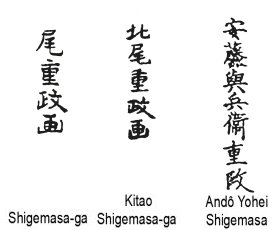| |
Kitao SHIGEMASA
|
|
SHIGEMASA has been referred to as "a chameleon" who adopted to changing styles. He is noted for images of beautiful women (bijinga). One of his best works is a set of unsigned prints in Ōban format, which were published under the series title “Beautiful Women in the East, West, South and North” (東西 南北 美人, Tōzai nanboku bijin). His main activity has been the production of illustrations for Kibyōshi (黄表紙), E-hon (絵本) or other types of stories or illustrated books. He was a close friend of the Ukiyoe artist Katsukawa Shunshō, with whom he worked. Outstanding example is a set of twelve large prints entitled “Rearing Silk Worms” (蚕 養 い 草, Kaiko yashinai-gusa) and another illustrated book with beautiful women (青楼 美人 合 わ せ て 姿 鏡, Seirō bijin awase sugata kagami) , which appeared in 1776 and displays the life of courtesans. SHIGEMASA is also noted for his haikai (poetry) and shodō (Japanese calligraphy), some of them are written on his woodblock prints.
Aliases - He signed as Kitao Shigemasa (北 尾 重 政), Andô Yohei Shigemasa (安藤与兵衛重政), Heikisui (壁 水), Hokuhō (北 峰), Hokusu Dempu (北 鄒 田 夫), Ichiyōsei (一 陽 井), Itsujin (逸 人), Karan (花 藍), Kōsuifu (恒 酔 夫), Kōsuiken紅 翠 軒), Kyūkaikyo (弓 巍 居), Shigureoka Itsumin (時 雨 岡 逸民), Suihō (酸 放), Tairei (台 嶺). In his later years he used the pseudonym Kōsuisai (紅 翠 斎)..
Disciples - SIGEMASA was an
excellent technician, major calligrapher and poet. He had
several disciples and founded the Kitao-Line of Ukiyo-e,
including Kitao Masanobu (北 尾 政 信; 1761–1816), better known as
Santō Kyōden, Kitao Masayoshi (北 尾 政 美; 1764–1824), also known
under the name Kuwagata Keisai (鍬 形 恵 斎; 1764–1824), and Kubo
Shumman (窪 俊 満; 1757–1820). He also had a major influence on
younger artists such as Torii Kiyonaga and Kitagawa Utamaro. His successor inheriting his name
was Shigemasa II (acting 1809~1847) ( ErDai Shigemasa, 二代重政).
There is speculation, that
Shigemasa II maybe the master or a kind of tutor for
Hiroshige III
(広重 三代), who used the pseudonym Shigemasa as well.
Copyright 2008 ff: Hans P. Boehme
